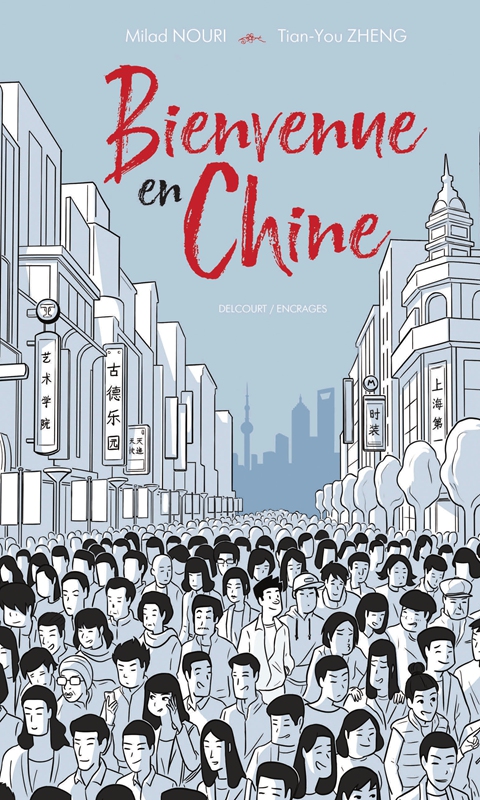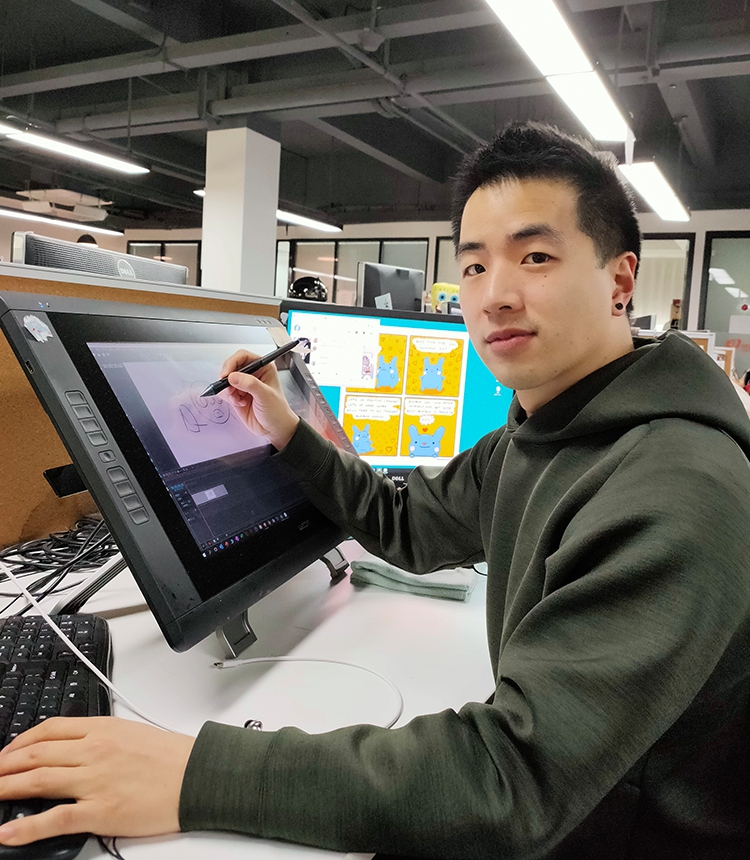
The cover of Bienvenue en Chine Photo: Courtesy of Zheng Tianyou
Before coming to China, Chinese-Belgian artist Zheng Tianyou never thought he would be able to get so close to his life's dream - directing a film based on one of his creations - before the age of 50. A storyboard artist by trade, the 35-year-old has gotten a step closer to making his dream a reality by directing the second season of the animated TV series
Kung Fu Wa for Tencent Video.
"I thought China was like in the Western movies where everybody does kung fu, but I realized that was a big fake impression in my mind after I came here when I was 15 years old for a vacation," Zheng told the Global Times, recalling his initial impression of the country that has now become his second home.
Curious about the Chinese language, Zheng returned to China again in 2011 to study the language and animation at the China Academy of Art in Hangzhou, East China's Zhejiang Province.
"This allowed me to learn Chinese and stay in an artistic environment at the same time," he said.
Career opportunitiesWhile studying in Hangzhou, Zheng visited a Chinese art exhibition. While there, he "fell in love with" Chinese painting and calligraphy, especially the art from well-known Chinese artist Wu Guanzhong.
"He [Wu] is from a really classic background with all kinds of paintings… Then he started to have those almost abstract ways of painting. I really like the way he painted Chinese ink on paper and the visual effect of it," he said.
After finishing his master's degree, Zheng did not think twice when he was given the opportunity to join Pear Studio, formerly known as Oriental DreamWorks, where he once completed an internship as a student.
"At that time Pearl Studio was doing
Kung Fu Panda 3 … The studio is a big company. I had been watching its movies since I was young, and working for them would be a huge opportunity for me… And that's why I chose to stay in China."

Zheng Tianyou Photo: Courtesy of Zheng Tianyou
New experiences Having lived in China for 10 years by now, Zheng said he has been very impressed by the rapid development of technology in China, pointing out things such as bike sharing, umbrella sharing and even basketball sharing.
"It's really the technological side with the smart phone and all the mobile apps that I find really interesting in China."
The outbreak of the COVID-19 pandemic in 2020 was also a special experience for Zheng who "somehow just managed to avoid the most serious period of the outbreak both in China and in Belgium."
In January 2020, Zheng went back to Belgium for a vacation; and later, when the COVID-19 pandemic in Belgium started to worsen, he returned to China on March 25, 2020, three days before China closed its borders.
"I was really, really lucky to make it back," he said.
"It is really amazing the way China has handled things. I think every country should do the same. But in Europe, it's definitely not great. I have friends in Australia, France, and the way they talk shows that their governments is not dealing with the pandemic in a good way," he added.
A chance meeting
By happenstance one day, Zheng ran into a Chinese-French entrepreneur living in China who wanted to create a book about Chinese culture so that people overseas could better understand the culture before visiting the country.
This encounter led to the birth of the comic book
Bienvenue en Chine, (
Welcome to China).
"I drew everything but most of the stories are from him. The comics are more like a business guidebook to introduce Chinese etiquette while foreigners are doing business in China. But it also includes some Chinese culture including China's Spring Festival travel season," he said.
"In France and Belgium, we got a lot of high reviews. Even Chinese readers said it's really true to life," Zheng said, noting the comics are published in French, but that they are considering English and Chinese versions.
After the success of the comics, Zheng has been thinking about drawing some comics that are more directly related to his life in China, but currently, he wants to focus more on directing the TV series.
"It's great to see the fast development of the Chinese animation market. We had a great movie that came out in China recently,
I am what I am... I think it may be one of the best movies I've watched this year."
When asked about the controversy that sprung up concerning the studio's choice to design the main character with slanted eyes, or single eyelids - which many Chinese netizens criticized as promoting stereotypes - Zheng said he thinks the idea of the whole controversy is a "detrimental" beauty standard.
"What I don't really like is the whole trend about appearance. I think it's really detrimental to the entire society and that it is why some young people feel bad about their looks."
"It's a good thing to accept beauty diversity."
As to the future, Zheng noted that his work on the film has energized him and that he wants to travel more in China.
"Though I've been here for 10 years, there are still some places, like [Southwest China's] Xizang [Autonomous Region] and Chengdu in Sichuan Province, that I haven't been to. Because every region is different that makes Chinese culture that is much more interesting."





